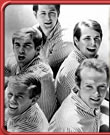 |
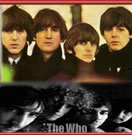 |
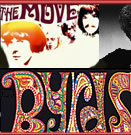 |
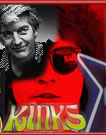 |
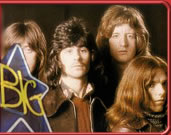 |
![]()
![]()
![]() A
Personal Viewpoint from Mr Qwerty
A
Personal Viewpoint from Mr Qwerty
There's a view that if it hadn't been for the
Beatles in 1962,or more importantly 1964 (from a US perspective),
then
the![]() western middle class might all be humming Frankie Avalon, Pat Boone, Adam
Faith and Shadows songs in
western middle class might all be humming Frankie Avalon, Pat Boone, Adam
Faith and Shadows songs in
the new millennium. A Sobering thought!
Luckily for us, the Beatles did appear, and so wrote the blueprint
for the Pop Song of the latter 20th Century. The seductive sound of two
guitars, bass and drums, a clever hooking melody and harmonies is so strong,
that to deviate from it, is close to ex-communication from life itself.
Slightly later, but almost at the same time, other British bands, like
the Who, the Kinks and the Move, built on the Beatles
blueprint with heavier guitars, lyrics beyond the simple love song to
mold the sound which the Americans called the British Invasion.
Not content with merely aping this challenge from their old colonial enemies,
the Americans in the form of the Byrds (with a nod to the Searchers
and Hollies as well as the Beatles), a maturing Beach
Boys, the Turtles and a thousand garage bands across the US,
took the blueprint and fired it right back at the British to produce a
cornucopia of variations on the original style.
It was Pete Townshend that coined the term Power Pop, when
asked by a Brit music paper in the late 60's "What type of music
do the Who play?", and so by 1969, the term and pretty much
the style had been born.
It lay dormant for a period, during which time the Beatles called
it a day, songs, hair and guitar solos got much longer and young white
men generally discovered the blues, merged it with their pop chops and
called it progressive. Woodstock happen, bands got it together
in the country, LP's started to sell in the quantities usually reserved
for singles, and rock music had arrived as Art.
Meanwhile in 1971/1972, in Memphis, where modern
pop music arguably started with Elvis back in the 50's, Alex Chilton,
teen hero of the Box Tops and Anglophile Chris Bell hatched
a marriage of all that was good that had gone before and came up with
Big Star. Released to a world that was not ready for them in 1972
and 1973 respectively, Big Star's first two albums define what
we come to know and love about modern Power Pop. A left field slant
on 60's pop, big chiming guitars, irresistible hooks, economical solos,
the right mix of hard and soft, Chilton's sloppiness married to Bell's
exactness. Almost 30 years on it's still close to heaven.
I found my copies of #1 Record and Radio City in a remainder
store for 50 pence a piece in the mid 70's - I couldn't believe my luck
- it was like I'd found the crown jewels and nobody knew.
Big Star weren't alone, in England there was Badfinger who
were at the time tragically overshadowed by their boss labelmates at Apple,
then beset by management, financial and later double suicide - but their
musical legacy is achingly wonderful. Nick Lowe's band Brinsley
Schwarz were alone voice in the 70's pub rock land penning slightly
country tinged melodic songs when all around was prog! In the States there
was the magnificent Raspberries, who by the time they made the
last and greatest album were clouded by their previous teen appeal, but
leader Eric Carmen possess one of the finest pop voices of all time.
The Stories, Dirty Angels, Blue Ash and Dwight
Twilley were also major shakers working in a similar area in the early
to mid 70's.
By the time the punk era came along, the die was cast and Powerpop was
subsumed into what journalists called New Wave, but early significant
artists would include Chris Stamey and the DB's, The Shoes,
The Beat, The Romantics, The Rubinoos, The Paley
Brothers, The Knack, 20/20, Pezband The Cars.
From England: The Records, The Jags, The Starjets,
Squeeze, XTC and The Freshies.
From then on, it kind of explodes, and then we are moving into the realms
of another article. The weird thing about all this, is why the classic
pop blueprint set by the Beatles all those years ago, although
captivating and full of hooks, has apart from one or two exceptions, generally
been so unpopular with record buyers? We have to fast-forward many years
before the appearance of REM in the 80's and later Britpop
in the shape of Oasis and Blur etc in the 90's.
However, Power pop is amazingly alive and well,
and for the most part it's still residing in the cult ghetto that has
been its home since the early 70's. No matter, the basic elements of classic
pop and power pop – lush melodies, big hooks, focused energy, and
unabashed enthusiasm – have been handed down through three generations
of musicians and endured despite the radical changes in popular music
over the same period. Somehow Power Pop seems to always find a way back
into our consciousness, usually in conjunction with other kinds of popular
music (i.e., disco, grunge) hitting spectacular new lows.
Jangle on!
This article is always in the state of revision
- one day I will get the story just right - Mr Qwerty